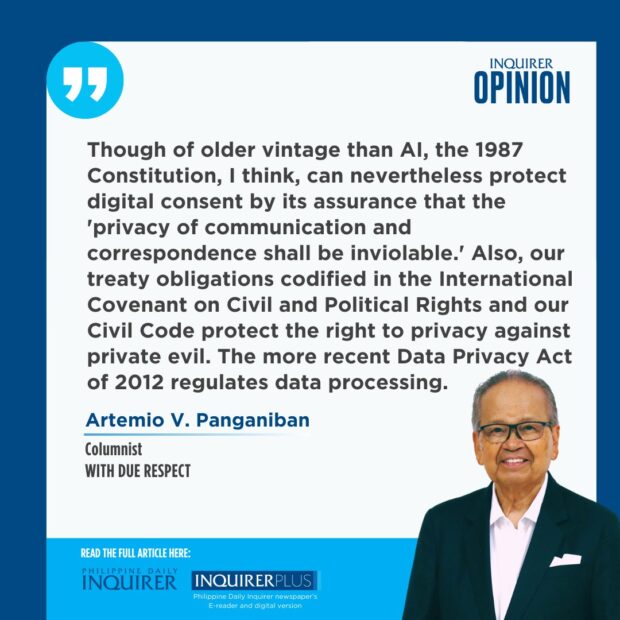
Lawyers (and the public in general) should not fear the many disruptions caused, and to be caused, by artificial intelligence (AI) except that “it will drastically reduce their billable hours” said so truthfully, yet so funnily, by tycoon Manuel V. Pangilinan (MVP) as the guest speaker during the awards ceremony last week for the new batch of 20 law scholars, five master’s of business administration fellows, and 30 dissertation writing contest winners of the Foundation for Liberty and Prosperity (FLP).
AFTER OBSERVING THE NOD AND SMILE of First Lady Louise Araneta Marcos, herself a brilliant lawyer and FLP’s special guest that evening, MVP explained, “Generative AI has the capacity to curate huge data and create new content—video, audio, and text which resemble human intelligence. And because its products, even if artificial, can loop back into the system, (it can) learn and become over time more human-like. AI will get smarter over time, so we must be wary of what AI can do now, and more so, in the future.” Nevertheless, he assured, “You will not be replaced by AI per se, but you can be replaced by a person using AI.”
Tackling the FLP’s advocacy, he advised that though “algorithms are the homecourt of AI, these can be rigid and fundamentalist. And we should be able to distinguish ourselves, not by competing with them, but by exercising liberty of thought, our talent to think, and combining our creative and innovative powers with AI. This is essential today in our continuing pursuit of prosperity.”
The AI server connected to say Netflix or YouTube interacts with its users. The algorithms of that server enhanced by human experience produce the data created by AI. Thus, it is erroneous to say that by itself, AI can run this world. It must interact with human beings.
Indeed, humans can take advantage of the speed and efficiency of technology to produce goods cheaply and more efficiently and to serve customers speedily and more effectively. Though robots can do repetitive processes in factories, law offices, and medical centers, they cannot replace human touch, empathy, instincts, ability to connect, and capacity to navigate emotions of crises.
THE RISKS AND PITFALLS OF AI constituted vital parts of the first prize (P320,000), well-researched, 77-page winning dissertation of Rachel Lois B. Gella, a law student at the University of St. La Salle in Bacolod. In her acceptance speech, she explained, “In sharing the philosophy of prosperity, Chief Justice Panganiban remarked that the best way to share prosperity is ‘to unleash the entrepreneurial genius of the people by granting them the freedom and the tools to help themselves and society.’
“Guided by such ingenuity, people have found ways to harness technology for economic prosperity. But as we move forward with the tools of technology at our disposal, we become more of a tool ourselves—tools that commercial entities can utilize through processes that are mostly unknown to us. With a tap on the screen, a part of your data can be lost to corporations; another tap and your personal information can be stolen from government agencies. One factor that warrants this interplay is consent.
“Consent permeates our lives in the digital landscape. We frequently consent to privacy notices and accept tracking cookies. These commercial practices can influence us against our actual interests, resulting in various ways in which digital consent can be compromised. And since liberty cannot be dwarfed into mere freedom from physical restraint, (paraphrasing) Justice George Malcolm, there will be no real liberty in the digital world when consent is rendered illusory.”
THOUGH OF OLDER VINTAGE THAN AI, the 1987 Constitution, I think, can nevertheless protect digital consent by its assurance that the “privacy of communication and correspondence shall be inviolable.” Also, our treaty obligations codified in the International Covenant on Civil and Political Rights and our Civil Code protect the right to privacy against private evil. The more recent Data Privacy Act of 2012 regulates data processing.
Ever alert to the potentials and pitfalls of AI, our Supreme Court promulgated its “Strategic Plan for Judicial Innovation 2022-2027” to anticipate the AI age. The Court speedily implemented this plan with several issuances and alliances, the latest being its data sharing with the Department of Justice and the Department of the Interior and Local Government, “to cut down redundancies and delays to deliver justice that our people need when they need it. Aside from the tangible improvements this is sure to bring in the disposition of cases, this streamlined data-sharing is going to be critical for more effective and more responsive policymaking in the justice sector.”
To be hailed is the effort of Congress in tackling bills like House Bill No. 7396 to establish an “Artificial Intelligence Authority” to develop a national AI strategy and HB 7913 to regulate the application and audit of AI systems to ensure the accountability of entities deploying AI technologies.
Indeed, properly contextualized and used, AI can fortify the safeguarding of liberty and the nurturing of prosperity under the rule of law.
—————–
Comments to chiefjusticepanganiban@hotmail.com